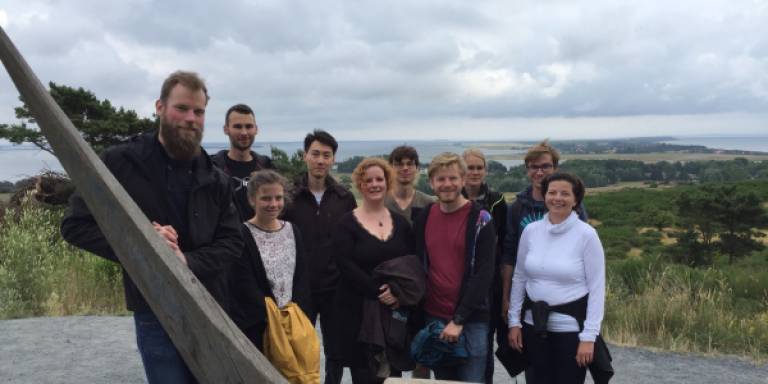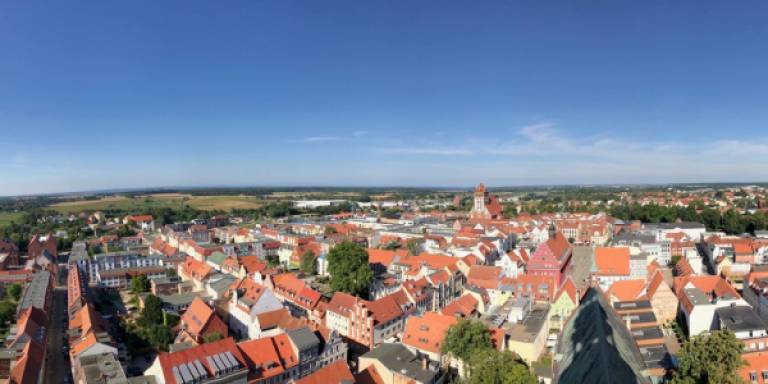Research at Ernst-Moritz-Arndt-Universität Greifswald
15 March 2019
Florian, a first year Biochemistry student spent a month on a research placement at Ernst Moritz Arndt Universität Greifswald in Germany. Read about his experiences and advice here.

Florian Hoffmann, Biochemistry
The Programme
In June 2018, I flew to Germany to do a four-week voluntary research placement at the Ernst-Moritz-Arndt-Universität Greifswald, Institute for Biochemistry in the lab of Prof. Dr. Sabine Müller. Since studying on the MSci Biochemistry course already gave me stunning insights into research and lab techniques that have and still will revolutionise the Life Sciences, I wanted to experience how these powerful methods work myself. There was plenty of time upon completion of my first year at UCL – 15 weeks of holidays so that it has been more than worth dedicating a month of it to thinking about my future career and also to see how studying and research is like outside the UK.

Professor Müller’s group is specialised in RNA (ribonucleic acids) which is the working copy of DNA. More precisely, they investigate catalytic RNAs, so-called ribozymes and aptazymes (see figure). Those molecular scissors can cleave themselves or other sequences of RNA. Throughout my project, I was supervised by a PhD student who had already worked on one of the ribozymes that I used as my reference system. This aptazyme could be regulated and was made catalytically active when a specific metabolite (FMN) was added. My tasks included the aptazyme synthesis, purification, determining the cleavage activity in comparison to other modified aptazymes and the experimental determination of binding capacities of various RNA systems for FMN.
Benefits
The project extended far beyond the knowledge taught in the first year, theoretically and practically. I pipetted more than I ever did before and learned some useful skills. For instance, that errors cannot be eliminated completely. Instead we always tried to introduce the same error to our samples which worked very well.
Furthermore, due to the omnipresence of a supervisor I could use many powerful techniques that a first-year student wouldn’t have access to with his or her student ID at UCL – MALDI mass spectrometers, Isothermal Calorimeters (ITC) and NanoDrop devices are well hidden behind security doors in Darwin Building (for good reasons of course). At the end of the placement, I wrote my first scientific report to summarise the results. Together with the acquired lab skills, this is something that I will certainly be taking advantage of in future research projects such as the master’s thesis and internships in the years to come.
Highlights
I was so lucky that I got the chance to join this particular lab since the work on nucleic acids was truly intriguing. On top of that I had a very committed PI and supervisors who trusted and encouraged me to be directly involved into the experimental procedures which was important to build confidence with the techniques and materials. They also took me with them to their group trip to Hiddensee which helped me get to know the individual personalities of the laboratory. Everyone presented their current research or a topic of interest. Since I was new to the lab, I talked about ethics of CRISPR/Cas9-facilitated genome editing.
How to tackle Challenges
The ‘Get the place’ challenge. It took a lot of time and many applications to finally get accepted for a place. Keep trying, don’t let rejections discourage you and don’t commit all your energy to one application. People you know might also help you.
The academic challenge. Although RNA catalysis was a completely new field for me, I could quickly build on the solid theoretical and practical foundations provided by UCL in my first year. I must highlight here that reading around the topic (older as well as recent papers) is essential to open the door to the matter that you are dealing with.
The social challenge. Connecting to other people in the lab – the principal investigator, students as well as lab staff – was something I was anxious about on my first day. Luckily, the whole team was very communicative and by joining the individual students in breaks and having little chats about their research projects, I rapidly didn’t feel like a stranger to the group anymore.
All in all, thinking about it as challenges might not be the right way. You should rather see those as opportunities that are waiting just a step outside of your comfort zone.
Advice for Students
- Think about your future: What do you aspire? Sometimes, it might also help you to uncover: ‘No, I don’t want to pursue this any longer.’ Explore new academic fields.
- Be proactive. Contact labs and universities if they can accommodate you.
- Meet many new people of different backgrounds. Personally, I am really looking forward to keeping in touch to the research group and particularly my supervisors.
- Extend your network which might have an influence on your future career.
- Think global!
 Close
Close

